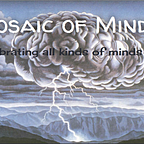Has the Experience of Late Diagnosis Changed?
When I was diagnosed in 2010, I had to create my own user’s manual. Today, would I be discovering it ready-made?
In the past 10–15 years, there’s been a fascinating change in what it feels like to be diagnosed neurodivergent as an adult.
My life has been defined by seeking explanations of my mind and body, finding none, and having to figure it all out myself. (I describe what that feels like in detail here).
I first learned about neurodivergence in the mid-to-late 2000s, and was diagnosed in 2010. There were no TikTok videos of people describing and validating the experiences I thought I was alone in having. There were, however, small, vibrant communities of neurodivergent people — they just hadn’t gone “mainstream.” Many of us were talking with people like ourselves for the first time.
Thus, like other neurodivergent writers at the time, I had to create words to describe my experiences. To my knowledge, my cohort gave us “executive dysfunction”, “rejection sensitive dysphoria,” “shutdowns” (as compared with meltdowns), and more. Meanwhile, we made “neurodiversity” a word known beyond disability communities.
We created much of the language that newly diagnosed people now live with, and perhaps taken for granted.
Now, many voices are telling the world what it’s like to be neurodivergent, using language that dates back to my days and even earlier.
Newly diagnosed people don’t have to create language to talk about their experiences any more. It’s already there, ready made. They just have to try it on and adjust it to fit.
Now that so much information from a neurodivergent point of view is easily available, neurodivergence no longer seems to be about struggling alone without answers, having to invent your own user’s manual.
I suspect that neurodivergence now has more to do with evaluating and navigating the diversity of neurodivergent viewpoints. Which experiences and language fit you, and which do not? How do you want to describe yourself to other neurodivergent people and to the neurotypical world? What do these choices imply about where you “fit in?”
What do you think? If you learned you were neurodivergent in the past few years, I’d love to hear from you!
What is it like, for you, to be neurodivergent? What has it been like to learn about your own neurodivergence? Have you noticed a “generational shift?”
